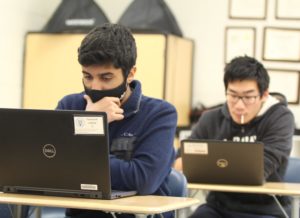Student services launches student support groups
Student Services organizes small groups of students to support their needs, including an executive functioning group. “Up until last year, I taught skills for organizing, planning, time management, study skills, working memory, and we had minimal results,” School Social Worker Danielle Armstrong said. “So last year, I tossed out everything and revamped it and started calling it the Block.”
November 17, 2022
School Social Worker Danielle Armstrong will form a small group of students this winter to make up an executive functioning group nicknamed the Block, which works on the blocks of motivation and procrastination.
Armstrong uses Social and Emotional Learning (SEL) surveys and counselor recommendations to collect candidates.
“We look at the SEL screener and put together a group. But it has over 70 kids, so we ask the counselors to choose who they think might be a good fit,” Armstrong said.
School psychologist Patricia Gerstman is also planning on forming a student group for anxiety.
“We look at the needs of the students to determine the types of groups that are provided,” Gerstman said.
A narrowed down list of candidates are then invited to the group, which usually meets during lunch for five to six weeks.
“Typically we start in February. This year, we will likely start the group [at] the beginning of December, but it may be after winter break,” Armstrong said.
Rather than teaching skills, Armstrong focuses on the emotions that inhibit executive function and has noticed a pattern of avoidance.
“Students get uncomfortable with some sort of emotion—either they don’t understand something, they feel like they’re an imposter, or the work feels like too much—so they avoid. The homework continues to pile up, and then you feel worse, and then the cycle just keeps going,” Armstrong said.
To break the avoidance cycle, Armstrong encourages students to lean into those emotions.
“That’s when we talk about values because values are a part of intrinsic motivation. Is there a way that we can make the work work for your values?” Armstrong said.
The main goal of the Block is to reduce students’ amount of missing work.
“A secondary goal is to help them feel like they belong, and that they’re connected to people at school who care,” Armstrong said.









